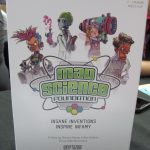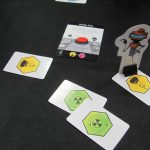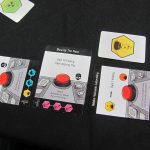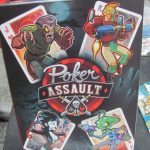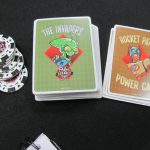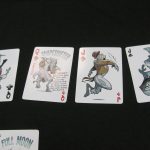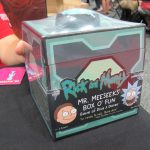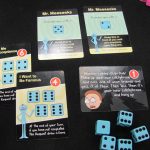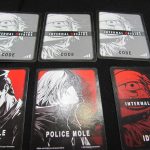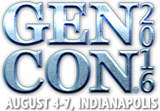 Recognition for best demo of the show, maybe ever, goes to Sharang Biswas in the Cryptozoic booth for his simultaneously hilarious and very informative run-through of the game he co-designed, Mad Science Foundation ($25). It’s a game about evil geniuses collaborating on the allocation of resources—cryptomium, lasers, dark matter, and sharks—as they build their dastardly inventions. Each turn, one player divides the resources in to bundles that the other players choose. Along the way, special minions can be recruited to help, such as the Sassy AI, the Spy, and the Truckload O’ Cash.
Recognition for best demo of the show, maybe ever, goes to Sharang Biswas in the Cryptozoic booth for his simultaneously hilarious and very informative run-through of the game he co-designed, Mad Science Foundation ($25). It’s a game about evil geniuses collaborating on the allocation of resources—cryptomium, lasers, dark matter, and sharks—as they build their dastardly inventions. Each turn, one player divides the resources in to bundles that the other players choose. Along the way, special minions can be recruited to help, such as the Sassy AI, the Spy, and the Truckload O’ Cash.
The next demo at Crytozoic’s booth was Poker Assault ($20) a head-to-head battle game played with poker hands. The cards are pretty much standard playing cards but each player has their own themed deck—vampire court, wolf pack, alien invaders, or rocket patrol—and certain cards provide thematically appropriate special powers.
Cryptozoic was also showing two new games based on the animated series, Rick and Morty. The Total Rickall Card Game ($15) takes on an episode where parasites manifest as fake memories. The Mr. Meeseeks’ Box O’ Fun Game of Dice & Dares ($40) is a dice allocation game with an action element. That is, players roll dice to complete certain patterns but if they’re unable to complete a pattern they can draw a Meeseeks card for help or even a out-of-game dare card (e.g., call a friend) for additional points.
Internal Affairs ($20) is a kind-of hidden-role deduction game previously released overseas that Cryptozoic has brought to the United States. The goal is to out two players from either the police or triad team, where a player’s team is determined by the majority of three Identity cards in front them. To get them to turn over an Identity card, though, requires other players to guess one of the numbered code cards in front of them. Various special action cards are also involved, including some that allow players to switch teams by exchanging Identity cards.
- Comments Off on Gen Con 2016—Cryptozoic
A line of collectible meeples is scheduled to hit retail in September. Dubbed “Mighty Meeples” by Cryptozoic, the 1 inch wooden game pieces will launch with 30 different figures based on DC Comics superheroes and villains. Ghostbusters meeples will follow in December.
Blind bags of three meeples will be priced at $3 and shaped tins with 6-7 meeples (including an oversized Stay-Puft Marshmallow Man) will carry an MSRP of $15.
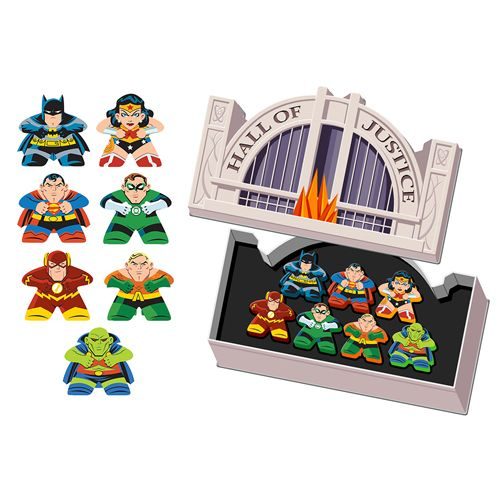
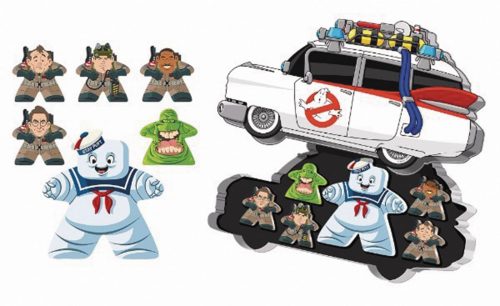
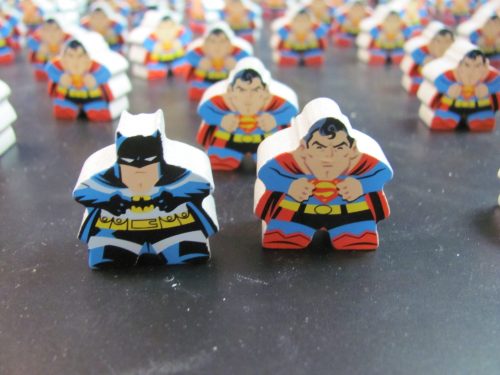
- Comments Off on Mighty Meeples—DC Comics and Ghostbusters
Cryptozoic Acquires Licensing Deal for Popular Anime ‘Attack on Titan’
15 Jul
Posted by Lory Gilpatric as Modern Board Games
 A few years ago, an action adventure manga won the hearts of genre fans in a story called Attack on Titan. The book series spawned an international hit anime television show, more than half-a-dozen video games, two feature-length films, and a myriad of merchandise.
A few years ago, an action adventure manga won the hearts of genre fans in a story called Attack on Titan. The book series spawned an international hit anime television show, more than half-a-dozen video games, two feature-length films, and a myriad of merchandise.
Thanks to a collaboration between Cryptozoic Entertainment and Don’t Panic Games, Attack on Titan will soon have a line of board games, too.
According to a press release, the first Attack on Titan board game, which is designed by award-wining game designer Antoine Bauza and Ludovic Maublanc, will be available internationally in 2016. It will be a cooperative style game with one person playing the roll of Titan and the others playing the heroes. ” The game features a revolutionary game mechanic, the Titan piece is a vertical game board element and the hero game pieces climb in an effort to take him down.”
Look out for a number of different Attack on Titan board games to launch over the next few years. Hopefully, the anime fan base won’t be as fickle with board games as they are with television shows.
- Comments Off on Cryptozoic Acquires Licensing Deal for Popular Anime ‘Attack on Titan’
Spyfall is a game of international spies and exotic locations. Every round, the players (all but one) are given a new location card and tasked with figuring out which one of them is the spy. If after trading veiled hints and answering each others questions everyone else can deduce who among them is the spy, the non-spies win the round. But if the spy, through careful listening, is first able to identify the location, he wins the round.
Spyfall, previously released in Europe, is now being imported to the United States by Cryptozoic. It’ll handle up to eight players and retails for $25.
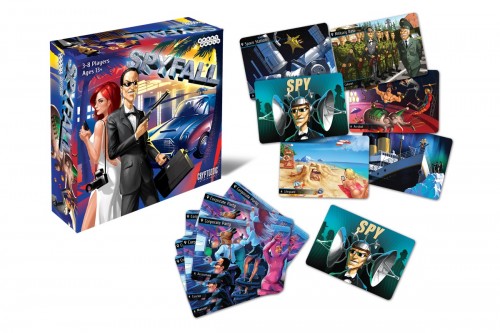
- Comments Off on Sleuth Out the Secret Agent in Spyfall
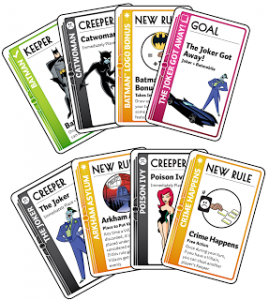 A lot of people are excited about Adventure Time Fluxx, which hits shelves on July 31st. How is it that I didn’t hear about Batman Fluxx until just now? Coming out August 7th, this version of Fluxx is based off the best incarnation of The Dark Knight yet…Batman: The Animated Series. Put out by both Looney Labs and Cryptozoic, the artwork I’ve seen already has me pining for the day of my youth.
A lot of people are excited about Adventure Time Fluxx, which hits shelves on July 31st. How is it that I didn’t hear about Batman Fluxx until just now? Coming out August 7th, this version of Fluxx is based off the best incarnation of The Dark Knight yet…Batman: The Animated Series. Put out by both Looney Labs and Cryptozoic, the artwork I’ve seen already has me pining for the day of my youth.
Mark Hamill will always be my Joker. Kevin Conroy, my Batman.
This is a version of Fluxx that will most certainly be added to my shelves. Even at $20, which seems a bit high for Fluxx, I’ll still snag it just for the theme.
- Comments Off on Batman Fluxx
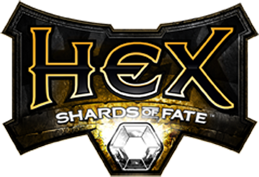 Wizards of the Coast isn’t the only company that has a problem with Cryptozoic’s Hex: Shards of Fate digital CCG. Cryptozoic’s trademark application for “Hex” is being held up by a potential opposition from Innovation First, makers of Hexbug robotic toys.
Wizards of the Coast isn’t the only company that has a problem with Cryptozoic’s Hex: Shards of Fate digital CCG. Cryptozoic’s trademark application for “Hex” is being held up by a potential opposition from Innovation First, makers of Hexbug robotic toys.
Cryptozoic is seeking a trademark covering computer game software, as well as “comic books, strategy guides,… trading cards, coloring books, adhesive stickers, rub-on transfers, notebooks and stationery-type portfolios, posters, greeting cards, calendars, pictures,… photographs, and prints.”
Innovation First holds trademarks covering “Hex” for toys and playsets and “Hexbug” for “downloadable computer and mobile game software”.
Innovation First has been given until November 19th by the Trademark Trial and Appeal Board to file its formal opposition. The company may be using that time to work out an arrangement with Cryptozoic.
[via The Cardboard Connection]
- Comments Off on Cryptozoic Also Irked by Hexbug
 Cryptozoic has filed with the federal district court in Washington its answer to WOTC’s suit over Hex: Shards of Fate. Not surprisingly, the answer by Cryptozoic paints a very different picture than the complaint by Wizards.
Cryptozoic has filed with the federal district court in Washington its answer to WOTC’s suit over Hex: Shards of Fate. Not surprisingly, the answer by Cryptozoic paints a very different picture than the complaint by Wizards.
Recall that WOTC alleges infringement of copyright, trade dress, and patents related to Magic: The Gathering. Cryptozoic’s reply [PDF], however, leads off with the bold statement:
Fearing competition in the trading card game industry, and frantic about the loss of its monopoly position due to the expiration of its patent two months ago, Wizards seeks to eliminate Hex: Shards of Fate through litigation rather than fair marketplace competition. Wizards is understandably concerned about the success and significant support Hex: Shards of Fate enjoys in a community yearning for innovation. Wizards’ Amended Complaint relies, in substantial part, on the hearsay allegations of unknown bloggers. The confused, vague, and egregious allegations in that Amended Complaint constitute a blatant attempt to use the legal process to achieve market dominance and eliminate a competitor which is creating truly competitive and innovative products.
Cryptozoic contends that Wizards of the Coast has improperly disguised a patent argument as a copyright claim, explaining that the issues raised are ones of function, not expression.
On the subject of trade dress, Cryptozoic argues that the question is whether the design of Hex cards creates confusion in the marketplace. Cryptozoic further points out that even the bloggers that WOTC quotes as comparing the two games clearly know the difference.
Finally, with respect to WOTC’s patent infringement allegation, Cryptozoic notes that the patent expired in June. At best, the company argues, any infringement was brief and represents minimal value.
 Wizards of the Coast today filed suit in federal court against Cryptozoic over the Hex: Shards of Fate online trading card game. WOTC claims infringement of various intellectual property rights in Magic: The Gathering.
Wizards of the Coast today filed suit in federal court against Cryptozoic over the Hex: Shards of Fate online trading card game. WOTC claims infringement of various intellectual property rights in Magic: The Gathering.
In a deliberate attempt to profit from Wizards’ valuable intellectual property and hard-earned reputation, Cryptozoic [has] copied the look and feel, the ornamental aspects, and the pleasing and ornamental layout of the functional features of Magic trading cards. Cryptozoic [has], further, implemented those copied playing cards in promulgation of a game that substantially duplicates the mechanics, plot, actions and elements of Magic, often retaining the same name for actions within the game play. Moreover, Cryptozoic’s willful intent to trade off of Wizards’ intellectual property and to create a false association between Hex and Magic is evident by the fact that it chose to copy the distinctive Magic playing pieces. Wizards brings this suit to address its considerable losses and prevent the willful infringement of its valuable intellectual property rights. Cryptozoic’s willful and malicious misappropriation has caused and will continue to cause irreparable and continuing harm to Wizards.
Specifically, Wizards of the Coast alleges infringement of copyright, trade dress, and patents and seeks $1.5 million in damages.
Interestingly, the complaint filed by WOTC quotes extensively from a blogger’s review of Hex, using the opinions stated by Threshold as evidence of similarity between the games.
- Comments Off on WOTC Sues Cryptozoic
Trending
- Massdrop.com
- Oh the Irony—Illuminati Card Game Continues to Inspire Conspiracy Theorists
- Home
- Footprints, an Educational Ecology Game
- USPS Adds Board Game Flat Rate Box
- Baila, the Estonian Drinking Card Game
- Crystal Caste Wins Dice Patent Suit Against Hasbro
- Mirror Game, Red and Blue
- Hasbro and Mattel Merger?
- Are Board Games Dangerous?
Archives
Most Popular Articles
- Oh the Irony—Illuminati Card Game Continues to Inspire Conspiracy Theorists
- The 20 Most Valuable Vintage Board Games
- The Truth About Dominoes On Sunday in Alabama
- Sequence Game, and Variants
- USPS Adds Board Game Flat Rate Box
- Baila, the Estonian Drinking Card Game
- The 13 Most Popular Dice Games
- Are Board Games Dangerous?
- Guess Who? The Naked Version
- What Happened to the Jewel Royale Chess Set?
Recent Posts
- Toy Fair 2019—Breaking Games
- Talisman Kingdom Hearts Edition
- Toy Fair 2019—Winning Moves
- Toy Fair 2019—Games Workshop
- Toy Fair 2019—Star Wars Lightsaber Academy
- Toy Fair 2019—Stranger Things Games
- Toy Fair 2019—HABA
- Licensing Roundup
- Game Bandit
- 2018 A Difficult Year For Hasbro But Not For D&D Or MtG
Recent Comments
- on Toy Fair 2019—Winning Moves
- on Game Bandit
- on Second Look—Dungeons & Dragons Waterdeep Dragon Heist
- on Crowdfunding Highlights
- on Beyblade SlingShock
- on Game Bandit
- on Game Bandit
- on Watch This Game!, the Board Game Review Board Game
- on Second Look—Vampire: The Masquerade 5th Edition
- on Palladium Books Loses Robotech IP License, Cancels Five-Year-Overdue Robotech RPG Tactics Kickstarter

